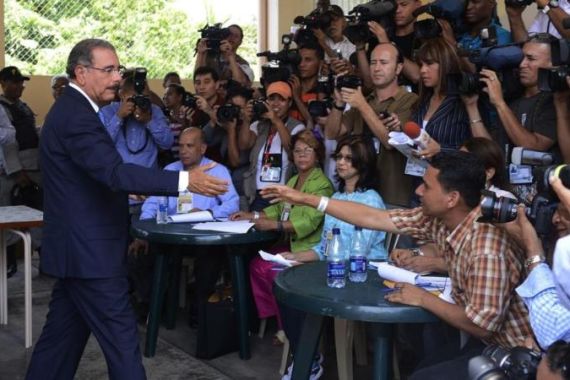Ruling party claims win in Dominican vote
Danilo Medina claims victory in presidential poll although the opposition candidate is yet to concede defeat.

Ruling party candidate Danilo Medina has claimed victory in the Dominican Republic’s hotly disputed presidential election, avenging his defeat 12 years ago by opposition candidate Hipolito Mejia.
With 99 per cent of Sunday’s vote counted, Medina and the ruling Dominican Liberation Party (PLD) held a 4 percentage point lead over Mejia, the candidate for the Dominican Revolutionary Party (PRD), according to official results.
“With this victory I want to unite the Dominican Republic,” Medina, 60, told a small group of supporters and PLD leaders at a ruling party office in the capital Santo Domingo.
“I have said that in this campaign I wasn’t competing for the presidency of the republic, I am building on a dream to end social injustice and put my people on a better path toward progress and well-being,” he said.
There was no immediate concession speech from Mejia.
PRD officials defiantly accused the Central Electoral Board of vote-rigging and fraud, even after US Ambassador Raul Yzaguirre endorsed the election as “a triumph of democracy.”
“We have our own vote count,” said Cesar Cedeno, who ran Mejia’s campaign and openly questioned the 51 per cent to 47 per cent margin giving Medina an outright first-round victory.
“We won these elections and we’re going to prove it to the country,” Cedeno said.
Both parties accused each other of vote-buying as ballots were still being cast on Sunday. But election observers, while confirming some of those reports, had said the cases were isolated and had no impact on the outcome.
Vote-buying allegations
Voting appeared smooth, though several people told The Associated Press news agency that backers of Medina were offering people payments of about $15 to vote for their candidate or to turn over their voting cards and withhold their vote for his opponent.
Medina campaign organisers denied the allegations, which have circulated in the country for weeks.
Francisco Alvarez, co-ordinating the 3,000 observers of the civic group Citizen Participation, said many reports had come in from around the country of vote-buying by local workers for both parties.
“Both the PRD and the PLD, in large measure, have been engaging in this practice,” Alvarez said at a news conference.
Observers from the Organization of American States confirmed several instances of vote-buying but not enough to taint the vote, which was “successful” overall, said the head of the mission, Tabare Vazquez, a former president of Uruguay.
Medina hopes to succeed President Leonel Fernandez, who spent $2.6 billion on major infrastructure projects as a subway system, hospitals and roads to modernise a country that is the top tourist destination in the Caribbean but remains largely poor.
Fernandez is constitutionally barred from seeking a third term. Medina is promising to boost economic growth in the Caribbean country.
Mejia has vowed to fight corruption and create jobs – but his critics point out that when he finished his first presidential term, the country was facing probably the most serious financial crisis in its history.
While the Dominican Republic is far wealthier than Haiti, its poor neighbour on the island of Hispaniola, many Dominicans still struggle to meet their basic needs, prompting some to seek a better life by slipping into nearby Puerto Rico, a US territory.
Many Dominicans blame poor Haitian immigrants for taking their jobs and getting involved in crime, which has doubled in the past decade.
The Dominican Republic is a popular resort spot, famous for its white sandy beaches and golf courses, but it also is the leading Caribbean trans-shipment point for South American drugs, destined for the United States and Europe.
About five per cent of the nation’s 6.5 million eligible voters live overseas, including 220,000 registered in New York state.